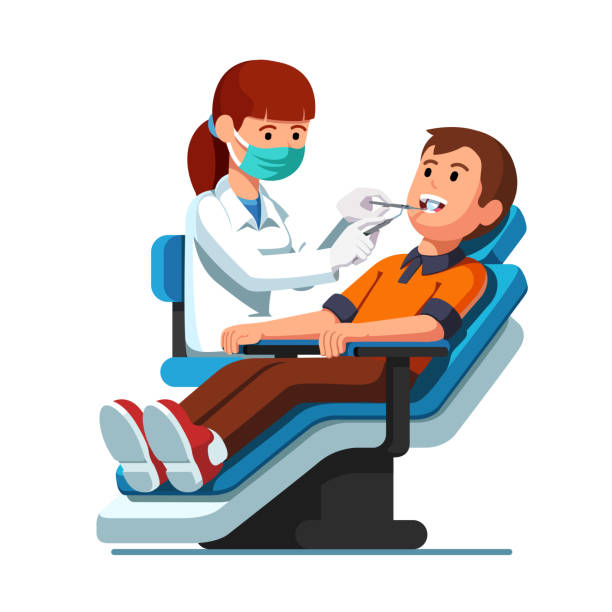A Guide to Common Oral Problems That Need a Dental practitioner's Treatment
Toothaches, for example, can be symptomatic of extreme concerns such as tooth cavities, cracked teeth, or abscesses, each requiring specific treatments like dental fillings or origin canals. Affected wisdom teeth and jaw problems can introduce substantial pain and issues.
Toothaches
Toothaches are a typical dental problem that can vary from moderate discomfort to severe discomfort, commonly showing an underlying concern that needs expert attention. This discomfort can come from a variety of sources, consisting of oral cavities, cracked or fractured teeth, and dental abscesses. Each of these problems postures significant dangers if left unattended, possibly resulting in extra extreme issues.
Dental tooth cavities, also recognized as cavities, are caused by the buildup of plaque that deteriorates tooth enamel, leading to holes or pits in the influenced teeth. Abscesses are painful infections at the origin of a tooth or between the gum tissue and a tooth, usually resulting from serious decay or untreated cavities.
Efficient treatment of toothaches includes dealing with the origin. This may include fillings for tooth cavities, crowns for cracked teeth, or origin canals and prescription antibiotics for abscesses. Very early intervention by an oral professional can protect against additional damage and relieve pain, ensuring ideal dental health.
Gum Illness
Gum illness, a widespread yet usually neglected oral problem, manifests via inflammation and infection of the periodontals and sustaining tissues. This problem mostly happens in two phases: gingivitis and periodontitis. Gingivitis, the milder type, provides with signs and symptoms such as red, inflamed periodontals that might hemorrhage easily during cleaning or flossing. If left untreated, gingivitis can advance to periodontitis, a more severe form defined by the damage of the sustaining bone and connective cells, inevitably resulting in tooth loss.
The key cause of periodontal illness is bacterial plaque, a sticky, colorless film that regularly creates on teeth. Poor dental health, cigarette smoking, genetic tendency, and certain medical conditions, such as diabetic issues, can intensify the risk of establishing periodontal illness. Regular oral check-ups are important for early detection and management of this condition.
Therapy for gum tissue illness varies from specialist dental cleaning and scaling to advanced treatments like root planing and periodontal surgical procedure, depending upon the seriousness. Maintaining excellent oral hygiene practices, consisting of brushing twice daily, flossing, and making use of an antibacterial mouthwash, can considerably reduce the danger of gum tissue illness and advertise much healthier gum tissues.
Cavities
Tooth cavities, likewise understood as dental cavities, are a typical dental condition identified by the damage of tooth enamel because of acid-producing bacteria in the mouth. These microorganisms prosper on sugars and starches from food and beverages, generating acids that gradually deteriorate the enamel, bring about tooth cavity development.
Early-stage tooth cavities might not reveal symptoms, however as they progress, they can trigger tooth pain, sensitivity to chilly or warm, visible openings or pits in the teeth, and staining. If left without treatment, cavities can permeate deeper layers of the tooth, possibly resulting in serious discomfort, infection, and even tooth loss.
Protecting against tooth cavities includes a combination of great dental health techniques and nutritional behaviors. Regular brushing with fluoride tooth paste, flossing, and regular oral examinations are critical. Dental practitioners may also suggest added safety nets, such as fluoride therapies and oral sealants, to secure teeth from degeneration.
Small cavities can be resolved with oral fillings, which bring back the tooth's structure. Much more advanced cases might require crowns or also origin canal therapy if the decay has reached the tooth's pulp.

Impacted Wisdom Teeth
Impacted wisdom teeth are a widespread oral issue that takes place when the third molars, typically described as knowledge teeth, fail to completely arise or align appropriately within the mouth. This condition typically arises from insufficient room in the jaw or an irregular development angle of the teeth. Impacted wisdom teeth can lead to a selection of problems, including pain, infection, and damages to surrounding teeth.
When knowledge teeth end up being impacted, they are often partly erupted or remain totally underneath the gum tissue line. This partial eruption can create a pathway for microorganisms to get in the gum tissues, leading to infections that manifest as swelling, pain, and even high temperature. Additionally, impacted knowledge teeth can apply stress on neighboring teeth, potentially triggering crowding or moving.
A detailed oral evaluation, normally including X-rays, is essential for diagnosing influenced knowledge teeth. Treatment usually entails medical extraction, done by an oral specialist. The procedure aims to minimize pain and avoid further difficulties, such as cysts or damage to surrounding bone frameworks. Post-operative treatment is important to ensure correct healing and minimize the threat of infection. Normal oral exams are a good idea to keep an eye on the condition and keep oral health and wellness.
Jaw Disorders
Jaw problems, collectively understood as temporomandibular joint (TMJ) conditions, encompass a series of conditions that influence the jaw joint and surrounding muscular tissues. These problems can show up with symptoms such as pain or inflammation in the jaw, difficulty eating, a popping or clicking audio when Resources shutting the mouth or opening, and even persistent headaches. TMJ problems can occur from different factors, including joint inflammation, jaw injury, or habitual habits like teeth grinding or jaw clenching.
Medical diagnosis of TMJ disorders typically entails a comprehensive examination by a dental professional, consisting of a physical assessment of the jaw, oral X-rays, and sometimes advanced imaging techniques like MRI or CT scans to evaluate the joint's problem. Therapy choices differ relying on the severity of the problem. Non-invasive methods such as physical therapy, oral splints, and medicines aimed at lowering inflammation and pain are commonly first-line therapies. In extra extreme situations, medical treatments might be required to remedy architectural concerns within the joint.
Early treatment by an oral expert is important to stop the progression of TMJ conditions and to maintain total oral health. Clients experiencing persistent jaw discomfort or disorder ought to seek timely evaluation and therapy.
Conclusion
Maintaining dental health and wellness necessitates prompt specialist care to address usual dental conditions. Toothaches typically show underlying problems such as tooth cavities, broken teeth, or abscesses, requiring timely intervention. Periodontal illness, from gingivitis to periodontitis, demands routine oral examinations and cleanings to stop progression. Influenced wisdom teeth and jaw disorders additionally require specialist attention to reduce discomfort and prevent more problems. Regular dental visits are necessary for diagnosing and dealing with these conditions, ensuring general oral health and wellness and wellness.
Dental cavities, likewise recognized as caries, are triggered by the accumulation of plaque that deteriorates tooth enamel, leading to holes or pits in the impacted teeth. Abscesses are painful infections at the root of a tooth or look at this web-site between a tooth visit homepage and the gum, generally resulting from serious decay or without treatment dental caries.

Furthermore, affected wisdom teeth can put in stress on surrounding teeth, potentially creating crowding or moving.
Comments on “The Benefits of Routine Appointments to a Dentist Eugene Oregon”